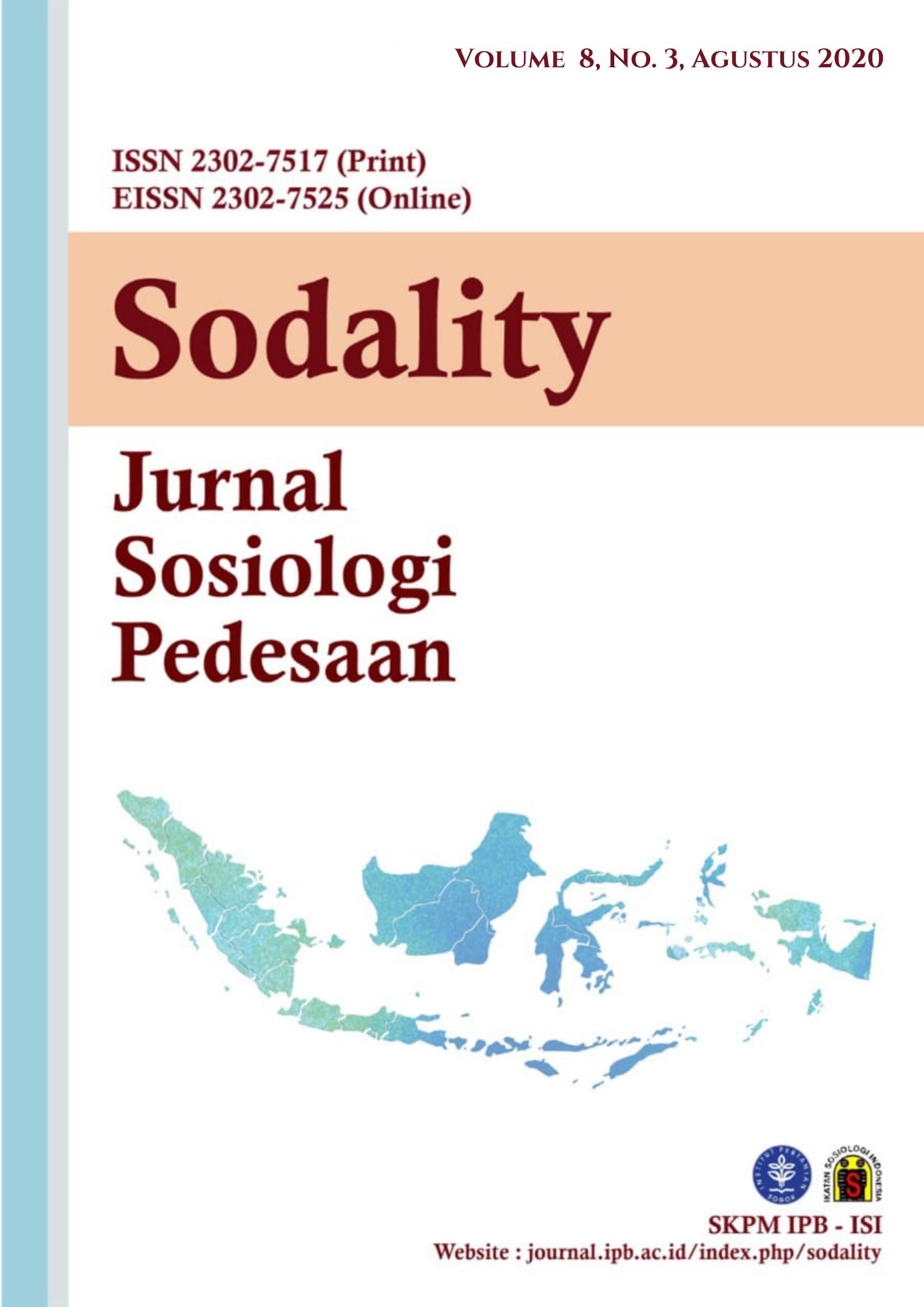The Influence of Dominant Local Actors in Villages Financial Management
Abstract
Based on a sociological perspective, problems in village financial management are not only in administrative problem but structural problem, which is an intervention from the government, so that access to village financial management is only owned by a handful of people. It has implications for the community participation space so the village development is not in accordance with the real hopes and needs of the village community. This study aims to identify local people who control village financial management and measure the influence index of these actors in carrying out their respective roles in Purwabakti Village and Sukadamai Village in Bogor Regency. The research was conducted using mixed methods The results showed that there were six dominant local actors in village financial management. Five of the six actors are village government officials who can be used as village secretary, village treasurer and chairman of the LPM, while one other actor is the head of the TPK Lapang for infrastructure development from the community. Based on the average value of the influence index of each actor, it can be concluded that the economic capital of the actor is the most important capital to be able to influence the community in the village with the rural characteristic, while the capital of moral actors is the most important capital to influence the community in teh village with the semi-urban characteristic. Actors in semi-urban villages also showed that their educational background and interaction with outsiders contribute to carrying out a structural role in the village.
References
Bourdieu, P. (1993). The Field of Cultural Production (R. Johnson (ed.)). Columbia University Press.
Bourdieu, P. (2005). The Social Structures of The Economy. Polity Press.
Bourdieu, P. (2008a). Key Concepts (M. Grenfell (ed.)). Acumen.
Bourdieu, P. (2008b). The Forms of Capital. In Readings in Economic Sociology. Routledge. https://doi.org/10.1002/9780470755679.ch15
Bourdieu, P. (2018). The forms of capital. In The Sociology of Economic Life, Third Edition. https://doi.org/10.4324/9780429494338
BPS Jabar. (2019). Statistik Keuangan Pemerintah Daerah Provinsi dan Kabupaten/Kota di Provinsi Jawa Barat 2019. https://jabar.bps.go.id/publication/download.html?nrbvfeve=MDgzNzQyMTlhZjAzNDRmZmM5MTBlZmM4&xzmn=aHR0cHM6Ly9qYWJhci5icHMuZ28uaWQvcHVibGljYXRpb24vMjAxOS8xMS8yOS8wODM3NDIxOWFmMDM0NGZmYzkxMGVmYzgvc3RhdGlzdGlrLWtldWFuZ2FuLXBlbWVyaW50YWgtZGFlcmFoLXByb3ZpbnNpLW
Casey, K. L. (2008). Defining Political Capital: A Reconsideration of Bourdieu’s Interconvertibility Theory. Critique: A Worldwide Student Journal of Politics, January 2005, 1–25. https://www.researchgate.net/profile/Kimberly_Casey2/publication/237710955_Defining_Political_Capital_A_Reconsideration_of_Bourdieu’s_Interconvertibility_Theory/links/5b16bddda6fdcc6d3e04cb2b/Defining-Political-Capital-A-Reconsideration-of-Bourdieus-Inter
Eko, S., Khasanah, T. I., Widuri, D., Suci, Handayani, Handayani, N., Qomariyah, P., Aksa, S., Hastowiyono, Suharyanto, & Kurniawan, B. (2014). Desa Membangun Indonesia. Forum Pengembangan Pembaharuan Desa (FPPD). https://www.suryaden.com/sites/default/files//dokumen/buku_desa_membangun_indonesia_sutoro_eko.pdf
Gilleard, C. (2020). Bourdieu’s forms of capital and the stratification of later life. Journal of Aging Studies, 53(November 2019), 1–6. https://doi.org/10.1016/j.jaging.2020.100851
Kane, J. (2001). The Politics of Moral Capital. University Press, Cambridge. https://doi.org/10.1017/CBO9780511490279
Kolopaking, L. M., Septianto, M., & Ambarita, E. (2019). The Synergy of Village Developing Management through Corporate Social Responsibility Activities. Sodality: Jurnal Sosiologi Pedesaan, 7(2), 102–109. https://doi.org/https://doi.org/10.22500/sodality.v7i2.26164
Lanjouw, P., Quizon, J., & Sparrow, R. (2001). Non-agricultural earnings in peri-urban areas of Tanzania: Evidence from household survey data. Food Policy, 26(4), 385–403. https://doi.org/10.1016/S0306-9192(01)00010-0
Meutia, I., & Liliana. (2017). Pengelolaan Keuangan Dana Desa. Jurnal Akuntansi Multiparadigma, 8(2), 336–352. https://doi.org/10.18202/jamal.2017.08.7058
Olii, R. R., Mahpudz, A., & Imran. (2018). Pengaruh Tingkat Pendidikan terhadap Partisipasi Politik Masyarakat di Kelurahan Tatura Utara Kecamatan Palu Selatan pada Pilkada Kota Palu Tahun 2015. Edu Civic Media Publikasi Prodi PPKN, 6(1), 42–52. http://jurnal.untad.ac.id/jurnal/index.php/EduCivic/article/view/11201/8650
Peraturan Menteri Dalam Negeri Nomor 20 Tahun 2018 tentang Pengelolaan Keuangan Desa, Pub. L. No. 20 (2018).
Peraturan Menteri Desa Nomor 3 Tahun 2015 tentang Pendampingan Desa, Pub. L. No. 3 (2015).
Ra’is, D. U. (2017). Kebijakan Pemberdayaan Masyarakat dalam Perspektif Asas Rekognisi dan Subsidiaritas Undang-Undang Desa Nomor 6 Tahun 2014. Reformasi, 7(1), 29–46. jurnal.unitri.ac.id › article › download%0A
Ritzer, G., & Douglas J. Goodman. (2007). Teori Sosiologi Modern (T. W. B. Santoso (ed.); 6th ed.). Kencana Prenada Media Group.
Sjaf, S. (2019a). Involusi Republik Merdesa (O. Al-Mustofa (ed.); 1st ed.). IPB Press.
Sjaf, S. (2019b). Mengukur Pengaruh Aktor dengan Indeks Casey. c, 1–5.
Sugiyono. (2019). Metode Penelitian Kuantitatif Kualitatif dan R&D (2nd ed.). CV Alfabeta.
Thomas. (2013). Pengelolaan Alokasi Dana Desa dalam Upaya Meningkatkan Pembangunan Di Desa Sebawang Kecamatan Sesayap Kabupaten Tana Tidung. Ejurnal Pemerintahan Integratif, 1(1), 51–64.
Triani, N. N. A., & Handayani, S. (2018). Praktik Pengelolaan Keuangan Dana Desa. Jurnal Akuntansi Multiparadigma, 9(1), 136–155. https://doi.org/10.18202/jamal.2018.04.9009
Tumbel, S. M. (2017). Partisipasi Masyarakat dalam Pengelolaan Dana Desa di Desa Tumaluntung Satu Kecamatan Tareran Kabupaten Minahasa Selatan. Jurnal Politico, 6(1), 1–21. https://ejournal.unsrat.ac.id/index.php/politico/article/view/16275/15778
Widhiastini, N. W., Subawa, N. S., Sedana, N., & Permatasari, N. P. I. (2019). Analisis Faktor-Faktor Yang Mempengaruhi Partisipasi Masyarakat Dalam Pilkada Bali. Publik (Jurnal Ilmu Administrasi), 8(1), 1–11. https://doi.org/10.31314/pjia.8.1.1-11.2019
Authors who publish with this journal agree to the following terms:
- Authors retain copyright and grant the journal right of first publication with the work simultaneously licensed under a

This work is licensed under a Creative Commons Attribution 4.0 International License. that allows others to share the work with an acknowledgement of the work's authorship and initial publication in this journal. - Authors are able to enter into separate, additional contractual arrangements for the non-exclusive distribution of the journal's published version of the work (e.g., post it to an institutional repository or publish it in a book), with an acknowledgement of its initial publication in this journal.
- Authors are permitted and encouraged to post their work online (e.g., in institutional repositories or on their website) prior to and during the submission process, as it can lead to productive exchanges, as well as earlier and greater citation of published work (See The Effect of Open Access).





.png)









